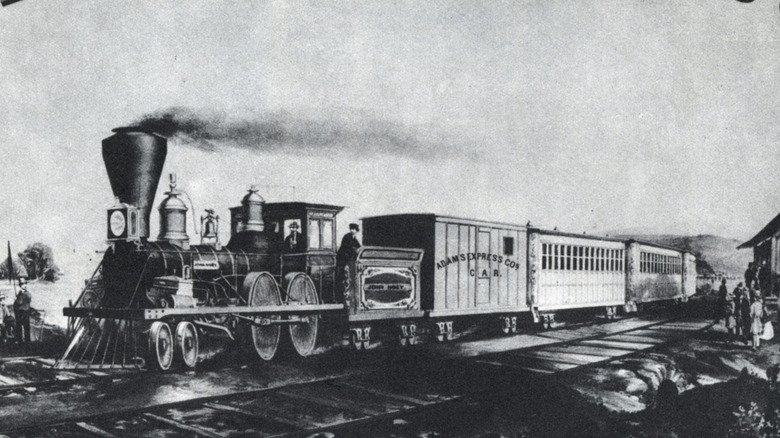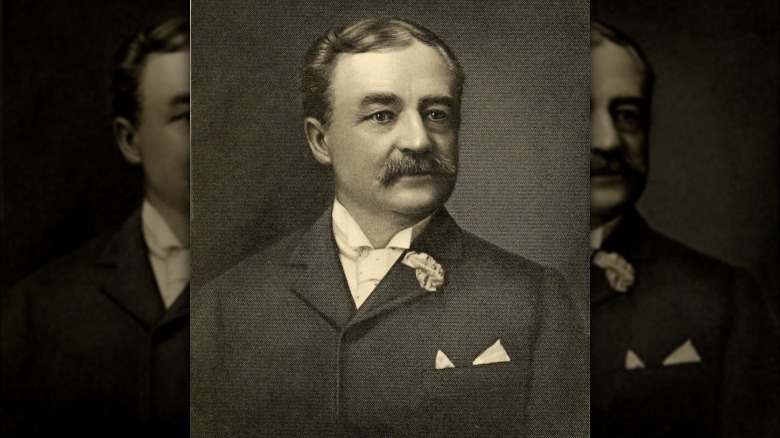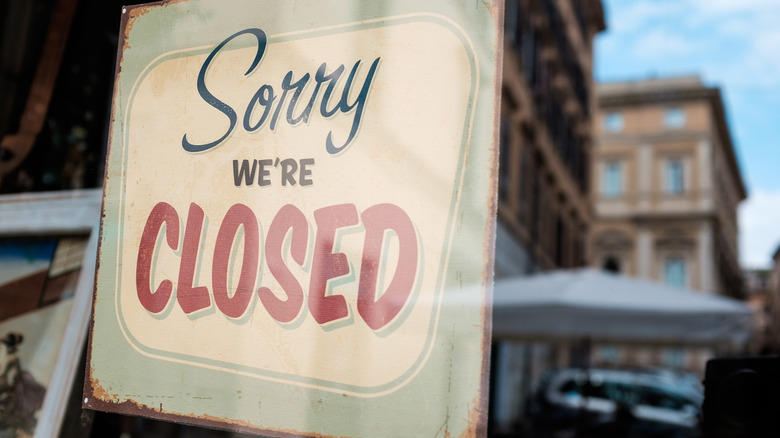Was There A Real Montgomery Ward?
For a couple of generations, American teens hung out at "the mall," an all-in-one retail, food, and entertainment destination that was a can't-miss business model — right up until it wasn't anymore. The slow, painful, and ongoing death of the mall as a shopping destination can be blamed on many things, including the general decline of brick-and-mortar retail, the COVID-19 pandemic, and changing attitudes about how and where we shop.
Back in the mall's heyday, larger retailers — Macy's, Saks Fifth Avenue, Sears — occupied larger sections of the buildings and were considered "anchor" stores. You can add Montgomery Ward to the list of mall anchor stores: For decades, the Chicago-based company was right up there with its competitors as one of the biggest American retailers. And then, one day in 2000, the entire business closed up shop across all of its hundreds of stores nationwide, as UPI reported at the time.
Today, the company lives on in name only in the form of online mail order; but for the addition of the word "online," the company has effectively gone back to its 19th-century roots, when one Chicago businessman came up with the idea to sell goods to rural customers via mail order. And yes, his name was Aaron Montgomery Ward.
Retail Deserts?
According to The Annie E. Casey Foundation, a "food desert" is a geographical region — a depressed urban community, a remote rural community — where ready access to affordable, nutritious food is difficult if not impossible. It's not a new problem: A century and a half ago, rural parts of the country were effectively "everything deserts," so far away were the residents from urban centers where they could purchase their goods that they were forced to rely on small-town retailers or traveling salespeople — of which Aaron Montgomery Ward was one, according to Wide Open Eats. Further, as The Pilot notes, at the time, there were "layers of people and companies" situated between the manufacturer and the consumer, inflating the price — particularly for rural consumers — and making things such as returning a flawed item for credit particularly difficult for those shoppers.
Aaron Montgomery Ward was himself frustrated by the experiences of his customers, and he decided that the time was right to change that.
The First Catalogue
For the better part of a century, Americans, shall we say, "completed the paperwork" after using the outhouse with pages from the Sears catalog (via History). And though today, the concept is largely relegated to the realm of being a visual joke, make no mistake — this is not a bit of made-up lore. The catalog was sent to millions of homes across the country, and when someone gives you a large amount of paper, free for the taking, what better way to put it to use?
Although the Sears-outhouse connection is a bit of Americana, theirs wasn't the first catalog used to sell retail goods via mail-order to American consumers. That honor goes to Aaron Montgomery Ward, who, after years of being frustrated by the complexities of selling goods to rural customers, decided to take matters into his own hands. In 1872, according to the company's website, he published his first catalog. At the time, it consisted of a single page — 163 items — but it would later expand into hundreds of pages, as Wide Open Eats notes.
The Right Place At The Right Time
Aaron Montgomery Ward's idea was to make use of two growing systems at the time: the expanding railroad system (at the time, Chicago was a major hub and where Ward headquartered its operations), and the expanding postal delivery apparatus, according to The Pilot. Being located near a major railroad hub and making use of the affordable shipping prices available via the Post Office enabled Ward to offer lower prices to his rural customers.
There were some other Ward-ian innovations that made his business model unique. The first was that there was no bargaining — the price listed was the price the customer paid, according to America's Best History. Another innovation was the satisfaction guarantee. According to The Pilot, if the customer wasn't happy with their product, Ward would refund their money. And finally, Ward pioneered the concept of installment payments (at least, as the concept relates to retail goods): Customers could make payments on products, enabling them to purchase more expensive items that they wouldn't otherwise be able to buy. Further still, whether Ward intended it or not, his business model was a boon to Black families, who might otherwise have been shut out of certain retailers due to Jim Crow laws.
Expansion and Contraction
In 1926, the Montgomery Ward Company (which was owned by a successor company, Aaron Ward having long since been in his grave by this time) made the decision to expand from just a catalog operation to a brick-and-mortar business (via Wide Open Eats). The first Montgomery Ward store opened that year in Plymouth, Indiana. Within three years, there were over 500 brick-and-mortar Montgomery Ward retail locations. The company was also directly involved in the cultural fabric that is the American Christmas: Robert L. May's poem "Rudolph the Red-Nosed Reindeer" was written in 1939 as a way to drum up interest in Santa and all things Christmas (and to get customers into stores to spend their money), according to Mainly Norfolk. Montgomery Ward got in on the act in 1946, distributing millions of copies of the book from its stores.
All good things must come to an end, however, and by the early aughts, Montgomery Ward was moribund, forced out mostly by more economical retailers such as Walmart, as well as the slow decline of physical retail spaces as a business model. The last of its stores closed in 2000 (per Wide Open Eats).
Back to the Beginning
These days, Mongomery Ward, as a retailer, has returned to its roots. And by that, we mean it is once again a mail-order business only, without being attached to any brick-and-mortar locations. The company's website is still active, and it is, for all intents and purposes, a catalog (only it consists of pixels on a screen instead of words on a page). The Ward-ian payment system still exists in the form of a "Buy Now, Pay Later" option, but consumers can also make use of the credit/debit card economy. The company's satisfaction guarantee still stands, although by this point, it's hardly unique in the retail industry.
The connection between the 2022 iteration of Wards (which has dropped the "Montgomery" from its name) and the original business is tenuous at best and, perhaps more accurately, non-existent. According to Wide Open Eats, the company has been owned by successor corporations over the decades, and its current owners own merely the "intellectual property" of the original company; which is to say, the modern owners own its name and its lore.





